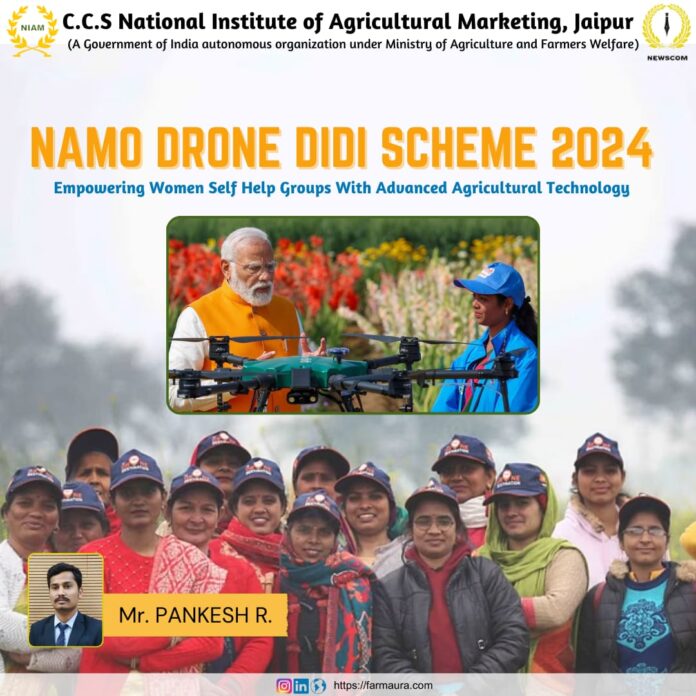India’s journey toward inclusive development in the agricultural sector has witnessed remarkable initiatives to uplift and empower women. Among these, the Namo Didi Scheme is a beacon of hope and progress, designed to transform lives and foster self-reliance among women in rural and semi-urban areas. This innovative program aligns with the broader goals of gender equality and economic empowerment, addressing the challenges faced by women in accessing resources, skills, and sustainable livelihood opportunities.
NAMO Drone Didi Scheme was launched by Prime Minister Sh. Narendra Modi through Video Conferencing on 30th of November 2023. This central sector scheme aims to empower Women Self Help Groups (SHGs) by integrating advanced drone technology into the agricultural sector. By equipping 15,000 SHGs with drones during 2024-2026, the scheme seeks to revolutionise agrarian practices by providing rental drone services for tasks like applying liquid fertilisers and pesticides.
This scheme is a collaborative venture between the Department of Agriculture and Farmers Welfare, the Department of Rural Development, the Department of Fertilizers, Lead Fertilizer Companies (LFCs), and other supporting entities.
The scheme provides Self-Help Groups with a fully equipped drone package that includes a supply assembly, a carrying box, batteries, a fast charger, and accessories such as a pH meter and anemometer. The package is covered by a one-year warranty, two years of annual maintenance, and comprehensive insurance.
With a budgetary allocation of ₹1,261 crore, the scheme not only enhances agricultural efficiency but also generates sustainable livelihood opportunities for rural women. Offering up to 80% subsidy for drone costs under Deendayal Antyodaya Yojana National Rural Livelihood Mission Self Help Groups (DAY NRL-SHGs) for purchase of drones and accessory accessories up to ₹8,00,000, access to low-interest loans from Agriculture Infrastructure Fund (AIF) @ 3% interest rate, and specialized drone pilot training for 15 days.
The implementation of the scheme hinges on the rightful selection of the area or cluster and Self-Help Groups in rural areas under DAY-NRLM where there is a demand for drones to provide agricultural services. Appropriate clusters where usage of Drones is economically feasible are identified. State Departments will strategically select Self Help Groups based on agricultural demand, with each Self-Help Group expected to manage around 2000 to 2500 acres annually, supported by close monitoring and guidance. An implementation and Monitoring Committee, led by the Additional Secretary of the Department of Rural Development, will guide and supervise the technical and operational rollout.
One of the members of women Self Help Groups, who is qualified will be selected for 15-day training comprising of 5-day mandatory drone pilot training and an additional 10 days training for agricultural purposes for nutrient and pesticide application. The other member or family member of the Self-Help Groups under DAY-NRLM with inclination to take up repairs of electrical goods, fitting and mechanical works will be trained as a drone assistant.
In addition, the Drone Portal, an IT-based MIS, will provide real-time monitoring, delivering services, disbursing funds, and tracking drone operations to guarantee the scheme’s smooth execution and effectiveness.
LFCs play a crucial role by bridging the gap between Self Help Groups and drone manufacturing companies, helping Self Help Groups with the procurement, repair and maintenance of drones. Additionally, they promote the use of nano fertilizers with drones, enhancing efficiency in agricultural practices.

Source: Digital Sky, DGCA
This initiative is expected to generate an additional income of at least ₹1,00,000 per year for each Self-Help Group contributing to economic empowerment and sustainable livelihood generation.
By integrating advanced drone technology into farming practices, the Namo Didi Scheme addresses the growing demand for precision agriculture while also creating sustainable income opportunities for Women Self Help Groups (SHGs). This initiative is not only developmental; it is a transformative movement that highlights the importance of empowering women as a key component of societal progress.
By providing women with access to skills, resources, and entrepreneurial opportunities, the scheme has elevated their economic status and enhanced their confidence and self-reliance. Reflecting on its impact, it becomes clear that initiatives like the Namo Didi Scheme play a crucial role in bridging gender disparities and fostering inclusive growth. Investing in the potential of women generates positive change that extends beyond individuals to families, communities, and the nation as a whole.




